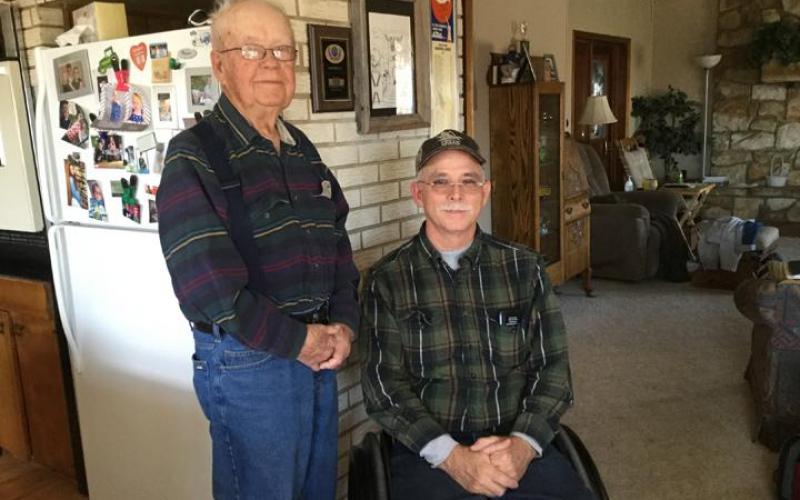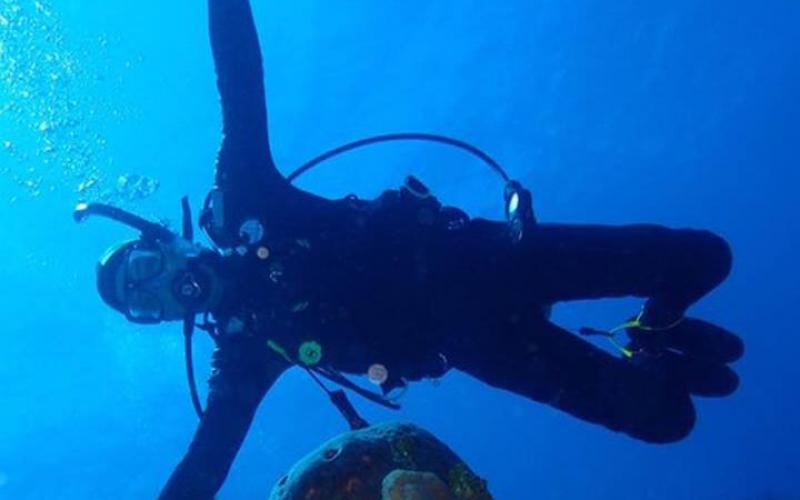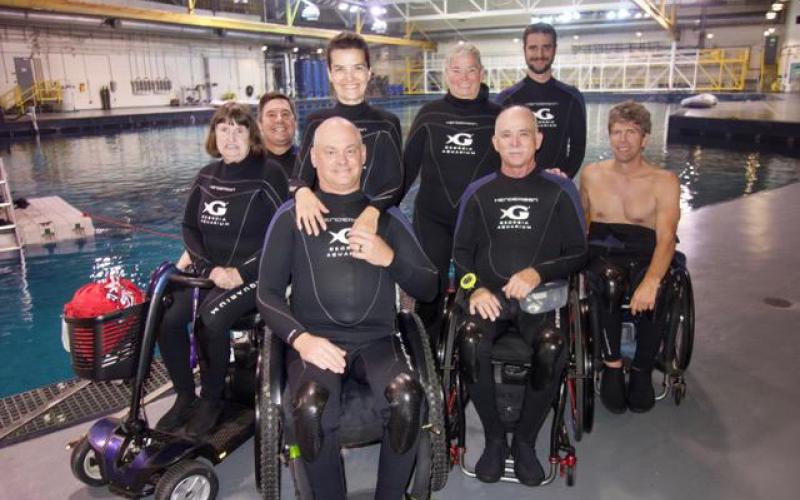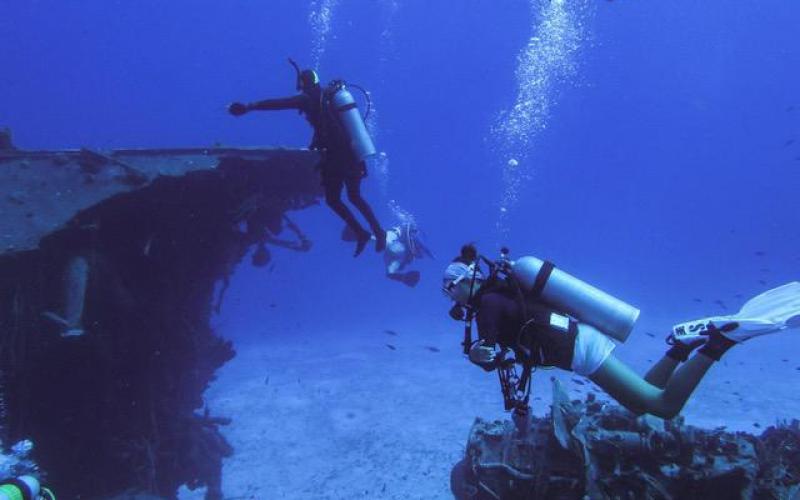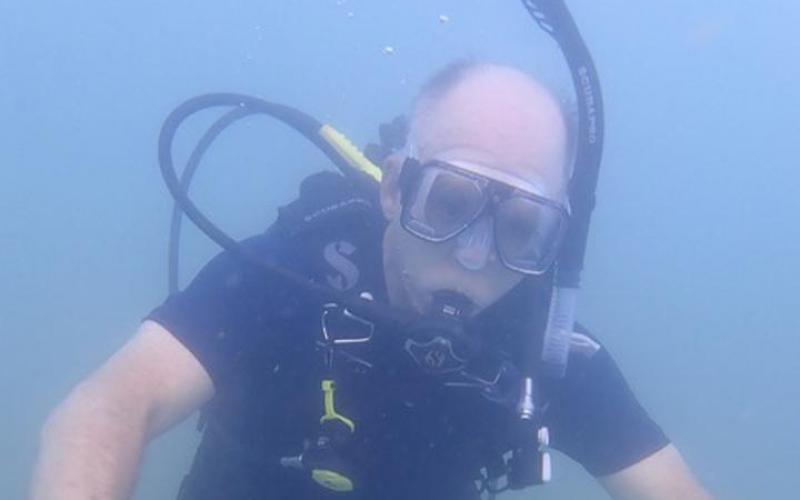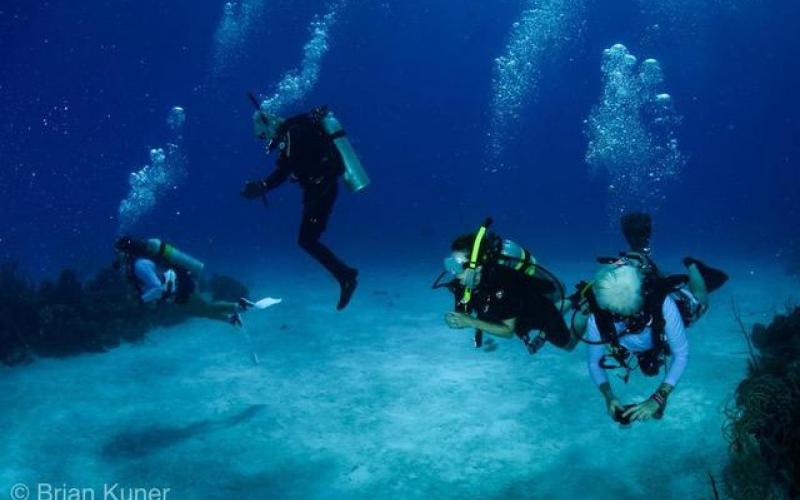Inspiration born from tragedy
Steve Holbert was always a daredevil. From the time he was a kid and into middle-age, he pushed his body to the peak of its abilities. He scuba dived, skydived, wind surfed, hang-glided, raced motorcycles, and spent his adult life as a pilot flying aircraft around the world.
"Even as a little boy, he was just off-the-wall adventurous," said his father Dean. "One time - I think he was six or seven years old - he grabbed a piece of tin that had blown off the barn, and some rope, and he got it in his mind that he was going to fly. He climbed a tree with it, and then he fell out of the tree. He just laid there on the ground for awhile, then he finally got up and dragged the stuff back to the barn. Never said a word to us about it."
Born and raised on a farm west of Concordia, Steve Holbert graduated from CHS in 1976 and joined the Marines. He really didn't know what he wanted to do with his life at that point, but being a Marine certainly seemed like a challenging adventure.
While in the Marines Holbert learned to scuba dive, and made a number of dives off the coast of California and Okinawa, Japan.
After his discharge from the Marine in 1980, Holbert moved to Houston, Texas, because a friend told him there were a lot of jobs available there. He thought he'd stay just a few months. Holbert's been living there now for 38 years.
Holbert returned to Concordia often to visit family and friends, and at Fall Fest in 1984 he showcased another daredevil hobby he learned in the Marines. Holbert brought three of his buddies from Houston, and they skydived on to Main Street during the parade.
Holbert remembered a comical moment from another jump he made at Blosser Airport.
"I was packing my chute, and people were watching me and asking questions," Holbert recalled. "Jimmy Bell, god rest his soul, was working as a police officer or deputy sheriff at the time, and he just stood there quietly watching. Eventually he came over and politely informed me that I had an arrest warrant for non-payment of a boating ticket at Glen Elder Lake from several years past. He told me that I might want to go down to the courthouse and take care of that as soon as I could."
Holbert always had an interest in aviation, all the way back to his youth when he tried to fly out of a tree using a piece of barn tin. While skydiving in Houston he made friends with a lot of the pilots, and one day one of them took him up in a small plane for his first flying lesson.
Holbert was hooked from then on, and earned his pilot's license in a little over a year. He kept at it, quickly adding more ratings: instrument training, commercial, and multi-engine certifications.
Holbert was hired for his first full-time job as a pilot for a charter leasing company, and in 1986 he flew the rock band Bon Jovi around the country on their 'Slippery When Wet' tour in a Gulfstream G-159.
"It was kind of cool to begin with," Holbert said, "but it wasn’t ideal for a young pilot trying to build flight time. We’d fly into a city, wait at the airport while they did a show, then fly them out to the next city, which was always less than an hour away."
Holbert soon tired of living out of a suitcase and sleeping in a different motel every night. One day, while waiting for the band at the airport in Evansville Indiana, he struck up a conversation with a mechanic working on a couple of Fairchild FH-227’s owned by Britt Airways. The mechanic told Holbert he should submit a job application to the company. Holbert did, and two months later he was hired as an airline pilot.
"Flying for Britt was just the opposite of the charter flying," Holbert said. "It was non-stop flying all day long, and I thought it was great."
Britt Airways was bought by Continental Airlines a short time later, and renamed Continental Express. Holbert continued his training on different types of aircraft, and was soon flying Embraer E-120's to Sao Jose dos Campos, Brazil.
In 1990 Holbert was hired by Continental Airlines as a Flight Engineer on the Boeing 727. He flew that jet for ten years, and eventually worked his way up to being a Captain on the Boeing 737 jetliner.
Now married with two children, Holbert had settled into comfortable life as family man working a job he loved while still pursuing a multitude of exciting hobbies that challenged him.
Then on November 2, 2009, in the blink of an eye... Holbert's life was turned upside down.
He still raced a little motocross, and was on the track at Conroe, Texas, practicing for a race when tragedy struck. Holbert went airborne off a jump, and only then saw a downed bike in his landing spot. He crashed into the bike and flew head-first over the handlebars of his own motorcycle. His head slammed into the ground, and the rest of his body, propelled by momentum, snapped backward.
Holbert fractured five vertebrae in his spinal cord. He was paralyzed from the chest down.
The reality of being paraplegic and confined to a wheelchair would be extremely difficult for anyone. For someone like Holbert, who had been physically active his entire life, it was particularly rendering. The lifestyle he had always embraced was taken from him forever, and no amount of self-determination or willpower was ever going to bring it back.
He had spent his life pushing his body to the limit. Now his body limited him.
When Holbert's father Dean was asked about the day he got the phone call informing him of his son's fate, there was no hesitation in his response.
"He's going to beat this thing," Dean Holbert said. "That's just the way Steve thinks. It's the way he's always been."
Steve Holbert vividly remembers those first few months after his catastrophic injury.
"It was really hard to not focus on all the things that I couldn’t do anymore, rather than thinking about what was still possible. I give a lot of credit to seeing other paralyzed people doing things that I just couldn’t imagine was possible. It gave me inspiration to keep pushing myself, and keep an open mind about my future."
Where once he flew jetliners around the world, parachuted out of airplanes, raced motorcycles and windsurfed the waves, Holbert now had to face the difficult challenge of just learning how to get out of bed each day. Things we do daily without a second thought - like pulling on our pants each morning - became a hurdle for Holbert to overcome. He now uses a grab bar bolted to the side of his bed and an old ski rope handle hanging from his bedroom ceiling to dress himself. He no longer has any control over his bowels and bladder, and cannot use his core muscles for something as routine as pushing the air out of his lungs with each breath. Confined to a wheelchair, Holbert now sees little rocks, sand, hills on a street and even carpeting in a house as a serious hindrance to his mobility.
While undergoing therapy at the VA hospital in Houston, Holbert met a quadriplegic who told him about adaptive scuba diving by a company called Dive Pirates, a non-profit foundation that teaches, equips and takes disabled people - especially disabled military veterans - on life changing scuba diving adventures.
Holbert applied to the foundation, and was accepted for adaptive scuba training in July 2018. The Dive Pirates also paid for a dive buddy to train with him. For his first dive, Holbert's sister Deanna volunteered. She had to be certified as a basic scuba diver, then certified as an advanced diver, and then a rescue diver.
Since Holbert does not have the use of his legs, he was taught how to steer and propel himself through water by paddling his arms. Again, without any lower core muscle activation, breathing through a scuba tank was problematic. Holbert learned how to swim downward in the water while never letting his head get below the rest of his body.
In late September, 2018, the Dive Pirates flew Holbert and his sister to the Cayman Islands. He was greeted by 13 other paralyzed of disabled men and women who would also be adaptive diving.
For all the memorable adventures Holbert has had in his life, his first time in the water - underwater, scuba diving - as a paraplegic is one of his most memorable.
"It’s really hard to describe the feelings I had, but it was great to be completely free of that wheelchair," he said. "In the water, I could actually forget about being paralyzed."
Holbert quickly formed a close bond with the other disabled divers, and was humbled by all the support and guidance from the Dive Pirates instructors.
"I hope some day I can pay forward all that generosity," he said.
Holbert now keeps busy as a board member for the Texas chapter of the Paralyzed Veterans of America. He's converted a section of his garage into a practice range for air rifle and archery competitions. He also shoots trap and sporting clays, rides a hand-cycle, and plays wheelchair softball and 9-ball pool.
Holbert recently began training twice a week at the VA hospital using a set of robot legs called the Indego. The device assists with some type of ambulatory functions for certain types of spinal cord injuries.
"I am definitely humbled by all the people that volunteer their time, effort and money to make all those things possible for me," Holbert said. "I hope my story will inspire or encourage somebody else to face their challenges or difficulties and get out there and try something. Plus I hope it will encourage some people to volunteer their time to disabled people."
Steve Holbert's story is not unique, but it is inspiring, because of the way it transformed him. He was once a man who thought there was no limit to what his body could do. But when that belief was taken from him, he found a different kind of strength. The kind of courage and determination that comes from the inspiration of others with disabilities, and the kindness of volunteers who have dedicated their lives to helping the disabled.
That is what makes Steve Holbert's story special. The world needs people like him to remind those of us who are not disabled of just how strong and determined the human spirit can be. And perhaps, even, to remind us that a little kindness and help can inspire those who are less fortunate to accomplish the truly magnificent.
The Dive Pirates Foundation earned the Platinum GuideStar Nonprofit Profile Seal of Transparency, the highest level of recognition offered by GuideStar, the world’s largest source of nonprofit information. If you would like to make a charitable donation, please visit their website divepirates.org
TO SEE MORE PHOTOS OF HOLBERT'S SCUBA DIVING WITH THE DIVE PIRATES, PLEASE VISIT THE BLADE'S WEBSITE bladeempire.com AND CLICK ON THE 'People' PAGE.


